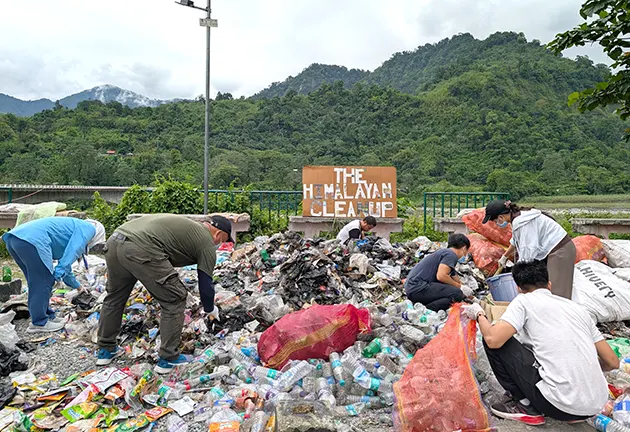ROING, 26 May: As many as 160 volunteers, including personnel of the 58th ITBP and the BRO, and members of SHGs, Ai Green Foundation, DUDA, and NGO AMYAA cleared over 10.9 tonnes of waste during a cleanliness drive organised on the banks of the Eze River and the DUDA view point here in Lower Dibang Valley district as part of The Himalayan Clean Up (THC)-2025 initiative on Monday.
During the programme, organised by AMYAA in collaboration
with Ai Green Foundation, the District Urban Development Agency (DUDA), and ArSRLM Roing, AMYAA president RK Paul Chawang emphasised the urgent need for collective action to safeguard the environment from the growing menace of plastic pollution. He also highlighted that THC is a coordinated annual movement observed across 11 Himalayan mountain states in India, as well as in Bhutan and Nepal, making it a significant regional environmental campaign.
The drive was launched by 58th ITBP Commandant Sachin Mittal, who in his address stressed the importance of making cleanliness “not just a one-day event but a regular daily habit.” He expressed appreciation for the initiative and his willingness to personally participate in similar events if organised more frequently, suggesting that “such clean-ups could be considered even on a weekly basis to build a sustained culture of environmental responsibility.”
Post collection, the waste was carefully audited and segregated under the leadership of Team AMYAA. “The initiative went beyond cleaning, focusing on waste minimisation and recovery, identifying recyclables like mineral water bottles, alcohol glass bottles, and carton papers, which were then sent to the materials recovery facility for proper processing and recycling,” the AMYAA informed in a release.
Among the waste collected, single-use polythene bags topped the list of pollutants, weighing in at 340.6 kilograms. The second most collected waste was mineral water bottles, contributing 81.5 kilograms, followed by a substantial 4,330 kilograms of alcohol glass bottles, it said.
“THC serves as a powerful reminder of the growing plastic pollution crisis that threatens our delicate ecosystems. It calls for urgent behavioural change among citizens, promoting responsible waste disposal, reduced usage of non-degradable materials, and environmental stewardship, particularly in public and natural spaces,” the NGO said.
“Each one of us holds a responsibility towards our environment. Small, conscious actions can collectively create a meaningful positive change. Let’s come together to protect and preserve the natural beauty of our homeland for generations to come,” it added.



